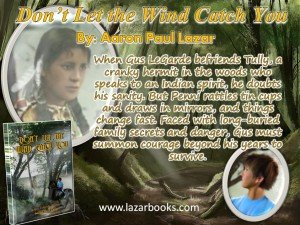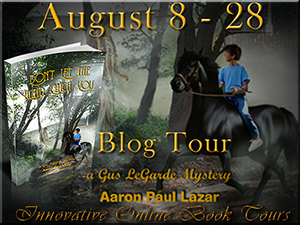As you may know, this week we are celebrating my fellow TTB author, Aaron Paul Lazar’s upcoming release, Don’t Let the Wind Catch You. I thought perhaps you would like learning about this wonderful writer and the mysteries he writes so well. Enjoy! D.

Q) How was writing Don’t Let the Wind Catch You different from the other books in the LeGarde Mystery series?
A) When I write from “young Gus’s” POV, I need to let myself go back to that eleven or twelve-year-old inside me. It was an age I remember with great clarity and with intense nostalgia. I simply try to be me (or Gus) at that age and let the story flow.
Sometimes I have to look up when certain songs or events took place, because I don’t remember the precise year they came out, etc. And of course I’d already created the characters of young Gus, Siegfried, and Elsbeth in Tremolo: Cry of the Loon, so it wasn’t hard at all. It can be almost like a magical trip back to childhood for me, which is probably why these types of books are among my favorites.
Q) Where does the German influence come from? Brigit Marggrander, the twins’ mother, has a real problem dealing with her past life in a Nazi concentration camp. How did this come into your story?
A) When I worked for Kodak I lived in Germany for months and visited frequently, thus my passion for German culture. And my daughter, Melanie, performed in “The Diary of Anne Frank” when she was in high school. I’d sit in the back of the auditorium during rehearsals and as time went on my hatred for the Nazis deepened. So I had to include some kind of theme here for my German twins’ mother. Also, I have always been fascinated by stories about asylums, especially in the older days. I realize that in the fifties and sixties mental illness was often considered an embarrassment, and people frequently went years without help like Brigit does in this side-plot of Don’t Let the Wind Catch You.
Q) Will you ever write a story that shows what happened to Siegfried in 1966? (The boating accident that made him lose his math genius and left him partially mentally impaired)
A) I do plan to write a sequel to Don’t Let the Wind Catch You, and it would make sense for it to take place the next year, in 1966. So stay tuned!
Q) How hard is it to take a fully mature adult character and portray him as a child? You did this with Gus LeGarde, Siegfried, Elsbeth, and also made Gus’s parents, The Marggranders, Oscar and Millie Stone, and the LeGarde grandparents thirty years younger in these “young Gus” stories.
A) It was actually a lot of fun to take the “adult” part away from my main characters who started in Double Forté (book 1 in the series) and bring them back to 1964. (Tremolo) I decided to show Siegfried, the gentle giant in Double Forté who lost his mental acuity, before his accident. It was fun to portray him as a bright, math genius who also excelled in orienteering. Bits of Siegfried transcend across time, of course, and can be found in the pre-accident young boy as well as the mature adult who works in Freddie’s veterinary clinic and around the LeGarde homestead.
Q) Where did you learn so much about horses? It seems like you really know the details. Research? Or first hand experience?
A) Ah, my horse chapters are among my favorites, mostly because I miss my own Morgan horses my wife Dale and I used to ride every day. We were both horse fanatics—one of the reasons we bonded so well before we were married. We talked horses all day long, cared for, rode, bought, and sold them. But mostly we adored them. When we were married, Dale brought her little Morgan mare out to live with us in Upstate New York, and I purchased my first sixteen hand high Morgan gelding. Oh, the rides we had. It was Heaven. As a child I also rode the woods with my buddies. But we never met up with a hermit or a little Indian ghost!
Q) You cover a difficult subject in this book with great sensitivity. Were you trying to teach a lesson in anti-bigotry here by “showing, not telling” how Gus reacts to the discovery that his grandfather loved another man?
A) I didn’t plan to do this – it just came about. I wanted to have a scandalous secret that was revealed over time, and it just happened to involve a gay couple who sadly had to give up their love because of the morés of the time. In hindsight, I think Gus’s reaction to this “taboo” subject was authentic. He hadn’t been tainted by discussion of homosexuality being an “illness” or that it was wrong. People didn’t discuss such things in those days, not openly, and especially not with children. I grew up when Gus did and never even heard about gay people until I was in college.
So I’m proud of Gus for his understanding and compassion, and glad that maybe in hindsight he can help folks young or old learn to accept people who don’t fit into a supposedly “normal” mold. I realize, also in hindsight, that I have included mini-lessons in all my books about accepting those people who aren’t perfect, like Siegfried (mentally damage) or Cindi (Downs Syndrome, from Upstaged), or Penelope (gay lover of Sam Moore’s daughter in For Keeps), or Raoul Rodriguez (transgender in For the Birds) or Slim (Huge black convict in FireSong), etc.
Q) Why did you choose mysteries? Was it an easy choice, or did you have to make a conscious decision?
A) I always read mysteries, since I was a kid. I used to read Hardy Boys, Agatha Christie, and all the “animal” mysteries I could get my parents to buy on the Arrow Book Club in elementary school. I remember reading about Black Diamond (a horse) and lots of dog stories. My folks read and adored John D. MacDonald and I, in turn, fell in love with the Travis McGee mysteries of the master, Mr. MacDonald. They also had Rex Stout, Agatha Christie, PD James, and more mysteries always available in plentiful quantities. I guess it was genetics. I was born to two mystery fanatics. So I really didn’t depart from the genre. When I began writing, it was almost a defacto decision to create a mystery.
Q) Do you enjoy writing?
A) I love the process of writing. It’s as if I’m living in the movie in my mind. It’s a fantastic escape mechanism and I crave the process like a drug addict. Lately I’ve had to do more promotional efforts and I must say, I don’t enjoy that as much as the pure process of creating!
Q) Do you write in a specific place or time of day? Do you keep a notebook to jot down ideas?
A) I write mostly in the early morning hours or the later, quieter moments of the day. But I can write anytime, anywhere. I have been known to write some great scenes in a hospital, waiting for family to come out of surgery, or in the airport, waiting for a plane to Germany. It seems whenever I have a moment to myself, it is the “perfect” time to write. Although I must say my favorite time to write is the dark, early hours of morning.
I don’t keep a notebook, but there is a file I have on my computer with “ideas for stories” that I occasionally refer to. Usually I have an idea brewing for one particular story that seems to overpower me. I think about it constantly. I dream about it. And then the new book begins to take shape. That’s my typical process.
Q) Do you know the end of a novel when you begin? Do you ever change your planned plot in midstream?
A) I don’t always know the endings in advance. I usually know the beginning and the general themes I will use. I start to write and let my characters take over, then as the themes deepen and become more complex, the ending seems to fall into place. If you’ve read my works, you’ll know I usually like to end my stories in an upbeat, positive fashion. People still die, someone is still hurt, but in the end, the stories resolve to a positive outcome.
Q) Do you discuss your work with family or friends?
A) I used to drive my wife crazy, asking her about what Gus LeGarde (my first protagonist in LeGarde Mysteries) would do, or what she thought of one plot twist or another. Lately, however, I’ve been giving her a break. I think I used to drive her mad! These days, I sometimes run my plot ideas by my wonderful mentor, Sonya Bateman, who is a superb writer and a great teacher. She’s shared so much with me over the years and I know my writing has improved dramatically because of her influence.
Q) The Genesee Valley is almost a character in your novels. Have you always lived there?
A) I moved to the Genesee Valley in upstate NY (just south of Rochester, NY) in 1981, the same year I married Dale and the year I started working for Kodak. Two years later, we had our first of three daughters, and we have lived here and loved it ever since. I can’t think of another place on earth I’d rather spend my days, it is so beautiful, with the rolling hills and the Finger Lakes.
***
About Aaron Paul Lazar
Aaron Paul Lazar writes to soothe his soul. The award-winning and bestselling Kindle author of three addictive mystery series, Aaron enjoys the Genesee Valley countryside in upstate New York, where his characters embrace life, play with their dogs and grandkids, grow sumptuous gardens, and chase bad guys.
Visit his website at www.lazarbooks.com and watch for his upcoming Twilight Times Books releases DON’T LET THE WIND CATCH YOU (August 15, 2013), the author’s preferred edition of UPSTAGED (FEB 2013), and SANCTUARY, book #3 in Tall Pines Mysteries in JULY 2013.
Help us drive Don’t Let The Wind Catch You to Amazon’s top rankings by purchasing it on August 15th, 2013 at:
http://www.amazon.com/dp/B00ECNEOTE

Tags: Aaron Lazar, Author interview, Book Promotion, Book review, Books, Creative writing; writing, Don't Let the Wind Catch You, Mystery, Mystery writing, The Creative Process, Twilight Times Books, writers, Writing, writing blog
Hi, Dora! Thank you so much for this fun interview – I had a blast thinking about the unique questions! – Aaron
It was my pleasure, Aaron. I wish you much success with Don’t Let the Wind Catch You.
Seems interesting, I’m going to read it!